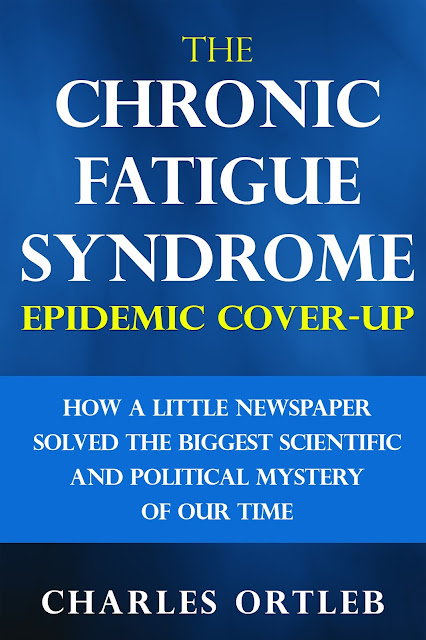Description of Brigitte Huber's 2010 CFS Research Project:
HERVK-18 AS RISK FACTOR FOR CFIDS
DESCRIPTION (provided by applicant): The etiology of Chronic Fatigue Syndrome (CFS) is far from understood and is likely due to multiple genetic components. Infection with EBV and treatment with IFN-a have been implicated in the pathogenesis. Our laboratory has shown that EBV-infection, and exogenous IFN-a?, activate transcription of the env gene of a Human Endogenous Retrovirus, HERV-K18. This provirus is normally silent, but when induced it encodes a superantigen (SAg), which is a class of proteins that is capable of deregulating the immune system. Three alleles of HERV-K18 env have been documented, K18.1, K18.2, K18.3, whose gene products have SAg activity, but are predicted to differ biochemically and functionally. Our working hypothesis is that HERV-K18 is a risk factor for CFS. In a pilot study, the allele and genotype distributions of the HERV-K18 env gene were compared between various groups of CFS patients and healthy controls. Although only a limited number of samples were available in the various cohorts, the odds ratios that were obtained were statistically significant. The most intriguing interpretation of these data are that they provide genetic evidence for the unique etiology of at least one group of CFS patients. Thus, it may be possible to delineate different subtypes of CFS, depending on the clinical history of the patients. It is now proposed to substantiate these pilot results, using a much larger cohort of 400 CFS patients associated with EBV that has been assembled by the co-investigator, Dr. Renee Taylor. Dr. Ben Katz, board certified in both Pediatrics and Pediatric Infectious Diseases, will clinically evaluate the patient cohort, and Dr. Inga Peter, a genetic epidemiologist and biostatistician, will oversee the statistical analyses. In addition, the expression pattern of the HERV-K18 SAg during active disease versus intermission will be measured. Furthermore, T cell stimulatory activity of this SAg, expressed on peripheral blood lymphocytes of patients during the course of the disease, will be tested ex vivo, using a T cell hybridoma reporter assay that has been developed in our lab. Since SAg-activated T cells produce massive quantities of chemokines, lymphokines and neurokines, the expression of the HERV-K18 SAg could influence not only the immune system, but other organs as well. A positive association between CFS and either HERV-K18 alleles or expression patterns would open new avenues for the development of clinical treatments of this chronic disease. CFS is a disease that affects a significant number of people worldwide, yet the underlying mechanism(s) of pathogenesis remains unclear. The herpesvirus EBV and IFN-a have been suggested to be associated with CFS, although these concepts are far from accepted. We propose a novel genetic aspect in the EBV/ CFS association, namely the presence of certain HERV-K18 alleles that differ in their superantigen activity
http://projectreporter.nih.gov/project_info_description.cfm?projectnumber=5R01AR053821-04
DESCRIPTION (provided by applicant): The etiology of Chronic Fatigue Syndrome (CFS) is far from understood and is likely due to multiple genetic components. Infection with EBV and treatment with IFN-a have been implicated in the pathogenesis. Our laboratory has shown that EBV-infection, and exogenous IFN-a?, activate transcription of the env gene of a Human Endogenous Retrovirus, HERV-K18. This provirus is normally silent, but when induced it encodes a superantigen (SAg), which is a class of proteins that is capable of deregulating the immune system. Three alleles of HERV-K18 env have been documented, K18.1, K18.2, K18.3, whose gene products have SAg activity, but are predicted to differ biochemically and functionally. Our working hypothesis is that HERV-K18 is a risk factor for CFS. In a pilot study, the allele and genotype distributions of the HERV-K18 env gene were compared between various groups of CFS patients and healthy controls. Although only a limited number of samples were available in the various cohorts, the odds ratios that were obtained were statistically significant. The most intriguing interpretation of these data are that they provide genetic evidence for the unique etiology of at least one group of CFS patients. Thus, it may be possible to delineate different subtypes of CFS, depending on the clinical history of the patients. It is now proposed to substantiate these pilot results, using a much larger cohort of 400 CFS patients associated with EBV that has been assembled by the co-investigator, Dr. Renee Taylor. Dr. Ben Katz, board certified in both Pediatrics and Pediatric Infectious Diseases, will clinically evaluate the patient cohort, and Dr. Inga Peter, a genetic epidemiologist and biostatistician, will oversee the statistical analyses. In addition, the expression pattern of the HERV-K18 SAg during active disease versus intermission will be measured. Furthermore, T cell stimulatory activity of this SAg, expressed on peripheral blood lymphocytes of patients during the course of the disease, will be tested ex vivo, using a T cell hybridoma reporter assay that has been developed in our lab. Since SAg-activated T cells produce massive quantities of chemokines, lymphokines and neurokines, the expression of the HERV-K18 SAg could influence not only the immune system, but other organs as well. A positive association between CFS and either HERV-K18 alleles or expression patterns would open new avenues for the development of clinical treatments of this chronic disease. CFS is a disease that affects a significant number of people worldwide, yet the underlying mechanism(s) of pathogenesis remains unclear. The herpesvirus EBV and IFN-a have been suggested to be associated with CFS, although these concepts are far from accepted. We propose a novel genetic aspect in the EBV/ CFS association, namely the presence of certain HERV-K18 alleles that differ in their superantigen activity
http://projectreporter.nih.gov/project_info_description.cfm?projectnumber=5R01AR053821-04











